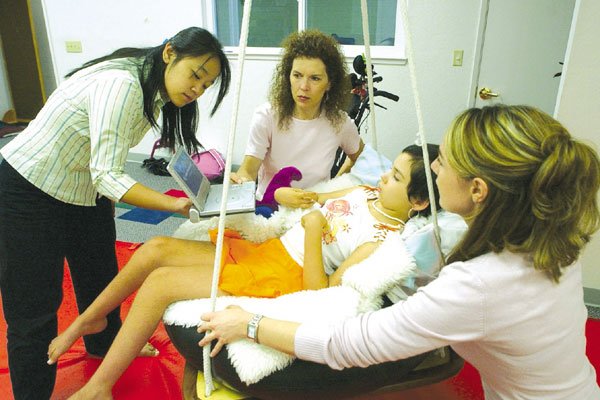When a child is born with a disability or is severely injured
slightly later in life, it’s not just the child’s future that
changes. Their parents and families must adjust to new
circumstances, new routines and new stresses both financial and
emotional.
When a child is born with a disability or is severely injured slightly later in life, it’s not just the child’s future that changes. Their parents and families must adjust to new circumstances, new routines and new stresses both financial and emotional.
These parents face trauma, hard work and social judgment along with job changes, financial stress and depression. But they also keep going for the love of their children, and thanks to the Americans with Disabilities Act, they have more programs, services and opportunities than parents with disabled children did in the past. It still does not make the transition easier.
“Every parent wants their child to be the next Barry Bonds or president of the United States, but then reality hits,” said John Reese, a Morgan Hill resident whose first and only son, James, was born with serious disabilities. “You go through that initial shock and anger, the sad issues and crying, but you finally get to that point where you can say, ‘This is my child, and I’m going to be there for them as long as they need.’ Then you go forward. You just do it.”
In Morgan Hill, parents Jacob and Debbie Hernandez experienced this change of life when their daughter Fernanda, then 9, suddenly collapsed last year.
Going into summer 2004, Debbie Hernandez had just finished helping put her husband through a Ph.D. program, and he’d landed a successful job in San Jose. With both of them working, they were suddenly flush with cash and had been able to purchase a four-bedroom home in a Morgan Hill subdivision. Debbie was also five months pregnant with their fourth child.
But on July 3, 2004, as the family was enjoying a warm summer evening at home, Fernanda suddenly complained of a headache. The pain got worse rapidly and she started to cry, then attempted to stand up. Instead, she slumped over, drooling and slurring her words. The Hernandezes called 911.
At Kaiser Santa Teresa, doctors quickly discovered a blood clot blocking the flow of oxygen to the right side of Fernanda’s brain. She was transported to San Jose Medical Center for emergency surgery. All the Hernandezescould do was wait.
To this day, the Hernandez’s don’t know what caused the blood clot that formed in Fernanda’s brain. Debbie simply remembers the powerful exhaustion that gripped her as she held watch over her daughter’s bed, exchanging places with friends and family members who took turns sitting watch at the hospital.
A year after the incident, the once-vivacious little girl is unable to speak. She stares to her left and can only move her arms. Even that motion – a small, unsteady punch accomplished with great deliberation and much time – is fleeting.
Fernanda cannot hold her hands in place, but she still understands her surroundings. She smiles when she sees people she knows. She giggles at jokes and loves listening to Hillary Duff. Doctors are not totally sure, but they think that mentally she’s still fully functional, simply trapped by her body. While doctors are not optimistic, Fernanda’s parents hold out hope that she’ll get at least a little bit better.
“When this happens, you become the wife, the mother, the nurse, the therapist, the nutritionist and the special education advocate – you have all these different roles you have to play,” said Debbie.
Typically up by 5:30am these days, Debbie, who was once a program manager for Hewlett-Packard Company, is now a full-time mom. She relies on a cavalcade of doctors, therapists, aides, volunteers, family and friends to help her and her husband care for Fernanda physically and financially. Giving up her job meant that the family’s income was been cut in half, and, were it not for Medical, they would be buried under a mountain of debt.
“We’re living on the limb, living on faith,” said Debbie, who is adjusting to the new stresses in the family’s lives.
A combination of Kaiser and Medical cover most of Fernanda’s medical needs, including an aide who sits by her side from 9pm to 5am, turning her regularly to avoid the development of bed sores. Friends, relatives and church acquaintances have all pitched in to help read to her and raise money through garage sales and fundraisers. The Hernandez’s church raised funds to buy all of the medical equipment Fernanda now requires, including a hospital bed, specialized wheelchair and shower chair with Velcro straps to hold her upright. Kent Construction in Gilroy recently donated an addition to the family’s home, remodeling the bathroom to be wheelchair friendly and tacking on a therapy room and outdoor wheelchair ramp.
“I was so naive when this happened,” said Debbie, who regularly wrangles with state agencies in an effort to secure access to special programs for Fernanda and her son Andrés, who is attending special education classes because of a developmental delay. She finally won her battle to get Fernanda educational services last week. “I’ve learned so much more about state law and how aggressive and assertive you have to be.”
But Debbie still has good days and bad days, she said.
“Yesterday was a bad day,” said Debbie. “It started out with Andrés waking up, and one of his eyes was shut. He had pink eye. Then, at 6pm, Fernanda started throwing up, and she threw up four times. We’d change the sheets, and she’d throw up. We’d change the sheets and throw up again. It’s just exhausting.”
Eventually, though, life settles into a steady routine, according to John and Mary Reese. During delivery, doctors weren’t monitoring their son James’ oxygen levels. The baby was strangled by his own umbilical cord, and no one is sure just how long he went without breathing.
Today, James is thought to have roughly the IQ of a six-year-old, though psychologists cannot be sure because they have never been able to establish a means of communication with him. He does not speak or walk. He sometimes has trouble holding up his own head.
James, who suffers from cerebral palsy with spastic quadriplegia with profound retardation, is able to attend daycare, so the couple still works. John is a field representative for United Food and Commercial Workers local 428, and Mary is a medical assistant for Kaiser Santa Clara, but that’s about the only thing that’s stayed the same.
Avid travelers before James’ birth, the Reeses now build their vacations around the availability of wheelchair access and adequate medical care. John carries his son upstairs each night and downstairs each morning since he’s now too heavy for Mary to lift.
“After he was born, there was the thought of having more kids or adopting, but Jimmy was so used to being the only child, and we weren’t sure he’d understand, so we decided against it,” said John. “Mary and I, our lives are centered around Jimmy and letting him have what he needs to experience as much as he can.”
The couple may not go hiking or camping, but they regularly go to see operas, symphonies, sporting events and movies. They’ve grown accustomed to stares and curious people, even those who pull their children away from James as if he’s contagious.
“Someone rude will make comments, and it hurts us, but the way we try to look at it is as an opportunity to educate someone,” said John. “Disabled people are a group of minorities that crosses every space in our country, every race, every religion, every nation. There are some people who are rude or who are just plain mean, so at some point you do feel like you need to make a stand, to say, ‘We’re here. The disabled are part of the community … so deal with it.'”
While he’s occasionally been angered by the actions of others, John maintains that he’s never been so stressed that he felt he couldn’t handle being near James.
“What actually relieves my stress is just seeing Jimmy happy. Seeing him happy is almost when… he’s not disabled. There are no worries, no outside stresses, just him laughing.”
For the Hernandez family, their strong ring of family and community support has been a lifeline, but Debbie said the thing that gets her through is a faith in higher powers.
“I read the Bible every day, and I surround myself with people who love and support me,” said Debbie. “It’s just when I’m really down that a card will come in or an e-mail will come and my life is better.”
Both families take their lives one day at a time, and the Reeses have done their best to prepare for questions of what the future may hold.
“Worst-case scenario, we have all the wills and trusts and legal situations set up,” said John. “In our case, we’re the oldest (of our siblings) and he’s a part of our families. All of them have committed to be there, to care for him if something happens to us.”
More likely, though, is another scenario. People with cerebral palsy can still live a full life-span, said John, but many of them succumb to early deaths because of health problems that result from the disease such as intestinal blockages.
“As a parent, you never believe you should be burying your child, but in this case, you have to think of that,” said John.
Day by Day
Since Debbie Fernandez quit working, she’s been busier than ever. With four children, two of whom have special needs, her days are action-packed and busy. Here’s a typical day:
5:30am
Get up. Get ready.
6:30am
Give Fernanda, 10, her medication, change her diaper and get her ready to eat.
7:30am
Get Andrés, 4, ready for school. Feed the family. Get Andrés to school.
8:30am to 1pm
Breastfeed baby. Go to Gilroy for Fernanda’s physical therapy or have the therapist come to the house. Clean. Make phone calls to doctors. Order medical
supplies online. Take Fernanda to San Jose for chiropractor’s appointment. Read to Fernanda. Get ready for Fernanda’s feeding.
1pm
Give Fernanda more medication. Eat lunch.
3pm
See speech therapist with Fernanda. Drive to San Jose to pick up Alejandra, 14, from Presentation High School. Pay bills. Do laundry.
5pm
Take care of Andrés now that he’s back from school. Get ready for dinner. Breastfeed baby. Eat dinner as a family.
7pm
Get everyone ready for baths and bed.
9pm or 10pm
Get to bed.














